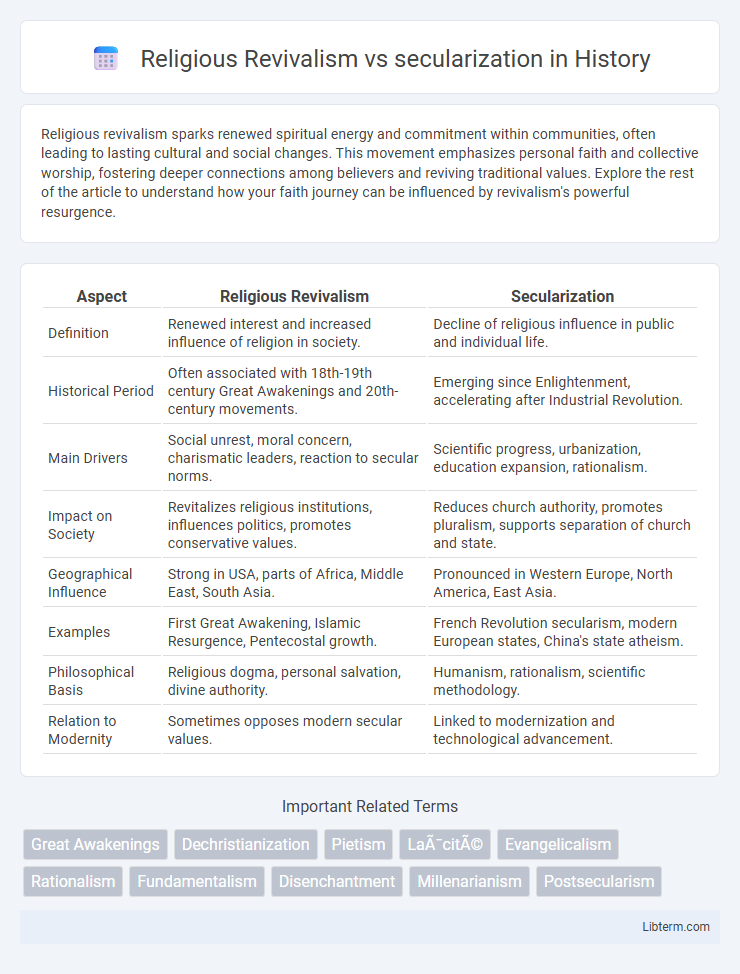Religious revivalism sparks renewed spiritual energy and commitment within communities, often leading to lasting cultural and social changes. This movement emphasizes personal faith and collective worship, fostering deeper connections among believers and reviving traditional values. Explore the rest of the article to understand how your faith journey can be influenced by revivalism's powerful resurgence.
Table of Comparison
| Aspect | Religious Revivalism | Secularization |
|---|---|---|
| Definition | Renewed interest and increased influence of religion in society. | Decline of religious influence in public and individual life. |
| Historical Period | Often associated with 18th-19th century Great Awakenings and 20th-century movements. | Emerging since Enlightenment, accelerating after Industrial Revolution. |
| Main Drivers | Social unrest, moral concern, charismatic leaders, reaction to secular norms. | Scientific progress, urbanization, education expansion, rationalism. |
| Impact on Society | Revitalizes religious institutions, influences politics, promotes conservative values. | Reduces church authority, promotes pluralism, supports separation of church and state. |
| Geographical Influence | Strong in USA, parts of Africa, Middle East, South Asia. | Pronounced in Western Europe, North America, East Asia. |
| Examples | First Great Awakening, Islamic Resurgence, Pentecostal growth. | French Revolution secularism, modern European states, China's state atheism. |
| Philosophical Basis | Religious dogma, personal salvation, divine authority. | Humanism, rationalism, scientific methodology. |
| Relation to Modernity | Sometimes opposes modern secular values. | Linked to modernization and technological advancement. |
Understanding Religious Revivalism: Definition and Origins
Religious revivalism refers to the renewed interest and enthusiasm for religion, often characterized by increased church attendance, fervent spiritual experiences, and the revitalization of religious practices. Originating historically during periods of social upheaval or moral crisis, revivalist movements seek to restore traditional beliefs and values amid perceived secular challenges. This phenomenon contrasts with secularization, which involves the diminishing influence of religion in public and private life, highlighting a dynamic interplay between religious fervor and societal shifts toward secular norms.
The Secularization Thesis: Key Concepts and Debates
The Secularization Thesis posits that as societies modernize, the influence of religion diminishes in public and private life, leading to a decline in religious authority, practice, and belief. Key debates challenge this thesis by highlighting the persistence or resurgence of religious identity and practices in modern and postmodern contexts, questioning whether secularization is linear or varies across cultures. Empirical research examines indicators such as church attendance, religious affiliation, and the role of religion in politics, revealing complex patterns that defy simple secularization models.
Historical Context: Waves of Revivalism and Secular Movements
Waves of religious revivalism have historically surged during periods of social upheaval, such as the Great Awakenings in 18th and 19th century America, emphasizing spiritual renewal and increased church attendance. Conversely, secularization movements gained momentum during the Enlightenment and industrialization, promoting rationalism and the separation of church and state. These alternating trends reflect the complex interplay between faith and modernity across different regions and eras.
Drivers of Religious Revivals in the Modern Era
Economic uncertainty, political instability, and cultural dislocation serve as primary drivers of religious revivals in the modern era by fostering a search for meaning and community. Technological advances and globalization facilitate the spread of revitalized religious movements through media and digital platforms, increasing accessibility and engagement. Social identity and resistance to secularization also fuel revivalism as individuals seek belonging and purpose within religious frameworks amid rapid societal change.
Factors Fueling Secularization in Contemporary Societies
Rapid technological advancements, increased access to education, and urbanization drive secularization by promoting rationality and scientific thinking over traditional religious beliefs. Globalization facilitates exposure to diverse worldviews, weakening the dominance of any single religious ideology. Legal frameworks ensuring separation of church and state further institutionalize secular values, reducing religion's influence in public life.
Case Studies: Religious Resurgence vs Secular Trends Worldwide
Religious revivalism manifests prominently in regions like the Middle East and South Asia, where movements such as Islamic revivalism and Hindu nationalism counteract secularization trends by reinforcing faith-based identities and practices. Meanwhile, Western Europe and parts of East Asia exhibit significant secularization, marked by declining religious affiliation and increasing emphasis on rationalism and humanism. These contrasting case studies highlight a global tension where resurgent religious fervor challenges the expanding secular framework in contemporary societies.
The Impact of Globalization on Faith and Secularism
Globalization accelerates the exchange of ideas, intensifying both religious revivalism and secularization across cultures. Increased connectivity spreads diverse beliefs, prompting some communities to reaffirm religious identities while others adopt secular worldviews. The tension between traditional faiths and modern secular values exemplifies globalization's role in reshaping spiritual and social landscapes worldwide.
Social and Political Consequences of Revivalism and Secularization
Religious revivalism often intensifies social cohesion among believers while exacerbating political polarization through the mobilization of faith-based agendas. Secularization typically promotes pluralism and individual freedoms, fostering inclusive governance but sometimes weakening traditional community bonds. The interplay between revivalism and secularization shapes policy debates on education, civil rights, and national identity, influencing both social stability and political power structures.
Religious Identity, Youth, and Changing Belief Systems
Religious revivalism often strengthens religious identity among youth by reasserting traditional beliefs and practices in response to perceived moral decline. In contrast, secularization tends to promote individualism and pluralism, leading many young people to adopt more fluid or evolving belief systems. The dynamic interplay between revivalism and secularization significantly shapes how new generations negotiate faith, culture, and personal meaning in contemporary society.
Future Trajectories: Coexistence, Conflict, or Transformation?
Religious revivalism and secularization are shaping future societal dynamics through complex patterns of coexistence, conflict, and transformation. Demographic trends, technological advancements, and shifting cultural values influence whether these forces will harmonize in pluralistic societies or exacerbate ideological divides. Emerging models suggest hybrid frameworks where secular governance adapts to resurgent religious identities, fostering negotiation rather than zero-sum outcomes.
Religious Revivalism Infographic

 libterm.com
libterm.com